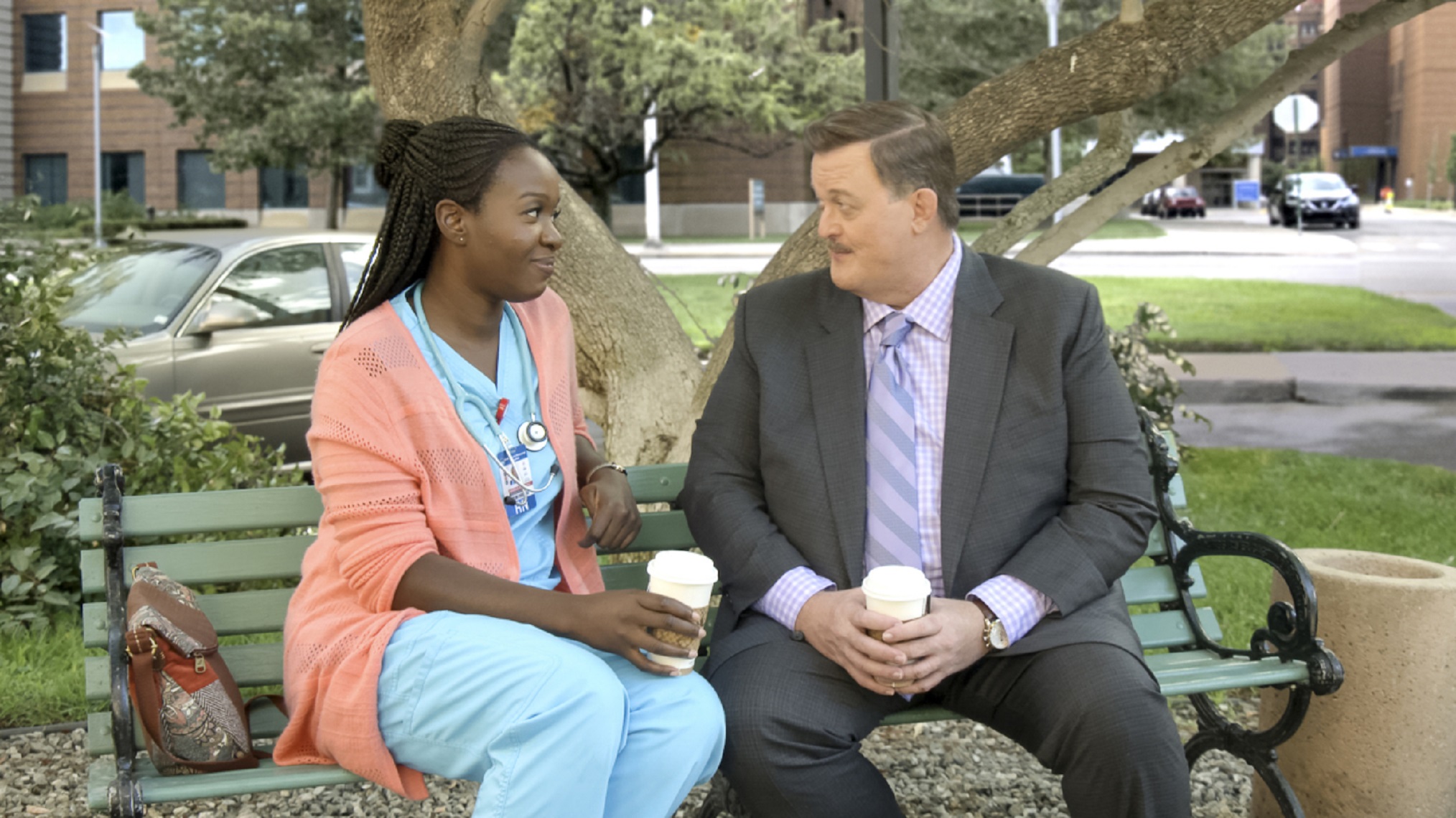CBS’ popular sitcom ‘Bob Hearts Abishola’ is a laughter-and-chaos-filled love story of a divorced Detroit businessman and a hardworking Nigerian nurse who helps him recuperate after a cardiac arrest. As the two navigate their clashing personalities and vastly different cultural backgrounds, the stage is set for romance and drama. The feel-good series is a co-creation of comedy king Chuck Lorre (‘The Big Bang Theory’), British-Nigerian comedian Gina Yashere, Eddie Gorodetsky, and Al Higgins.
Starring talented actor-comedian Billy Gardell as the charming and dorky Robert ‘Bob’ Wheeler and Folake Olowofoyeku as the stern and practical Abishola Bolatito, the show has been lauded for its realistic portrayal of Nigerian immigrants in America. Over the years, the show has garnered a loyal fanbase due to the chemistry between the lead pair and its faithful depiction of the immigrant experience. Thus, it is natural for many to wonder whether the narrative of ‘Bob Hearts Abishola’ is rooted in reality. If you are curious about the same, we’ve got your back. Let’s find out!
Is Bob Hearts Abishola a True Story?
‘Bob Hearts Abishola’ is partially based on a true story. In an interview with Essence, co-creator Gina Yashere revealed that Abishola’s character, a single mother with a hectic job, is fully rooted in her own experience in America as a member of the ethnic group called the Yoruba community. “That is my story. That is my mother’s story,” she stated, having witnessed her own father leave her family in England to return to Nigeria. The show’s humorous exploration of the clash between American and Nigerian culture stems from this personal observation of the lived experience of immigrants.

Yashere added, “So there’s a lot of stuff in Abishola that is one hundred percent based on my actual life and it’s kind of nice, bringing my story to screen but, also, bringing the culture to screen.” Abishola’s hesitation to file for divorce, her insane work ethic, and her differing ideas of love and intimacy ring true with many Nigerian immigrants in America, who attempt to constantly merge their two worlds. The family dynamic (between Abishola, her son, aunt, uncle, and estranged husband) arises from this complex identity, often misrepresented and homogenized in media, as well.
With Yashere’s personal experience and comedic background being instrumental in the creation of Abishola and her loved ones, it comes as no surprise that the show explores Yorùbá culture and interracial relationships with enough honesty and finesse. Not only does it attempt to spread laughter, but it also tries to spread awareness and preach cultural compassion. This resonates deeply with lead actress Folake Olowofoyeku as well, who moved to America from Nigeria at the age of 18.
Belonging to the Yoruba community as well, Olowofoyeku could connect to her character Abishola, and in fact, channeled her own mother and aunts to do justice to the same. The versatile actress also contributed to the development of the plot, characters, and dialogue. The show does feature a healthy dose of the Yorùbá language (with subtitles) and culture (including their attires and customs), along with three-dimensional supporting characters, such as Auntie Olu, Uncle Tunde, Kemi, Kofo, and Goodwin.
With this spotlight on a Nigerian character being a first for American sitcoms, the show follows the path of a typical boy-chases-girl (Bob is romantic and eager, Abishola is skeptical and hard-to-impress) trope without fully slipping into clichéd or mundane themes. While some have pointed out that the show makes use of age-old stereotypical tropes to generate humor, others claim that it works because those writing it are borrowing from personal experience and not simply wielding what’s convenient.
Spearheaded by those who lived the experience they are portraying on-screen, ‘Bob Hearts Abishola’ attempts to diversify American sitcom and authentically represent an interracial relationship, all while leaving smiles on people’s faces. It borrows from real life and uses fiction to highlight the universal values of love and compassion shared by diverse individuals and cultures. Shows like ‘Dear White People,’ too, have used humor to look at the black and immigrant experience in modern America.
Taking the aforementioned factors into account, clearly, humor and fiction have the potential to explore the realities of everyday life more deeply. The eccentricities of two different cultural perspectives combined with the basic elements of an American sitcom enable ‘Bob Hearts Abhishola’ to be lovable as well as authentic. A pinch of truth and a pinch of exaggeration makes this show click.
Read more: Where is Bob Hearts Abishola Filmed?

